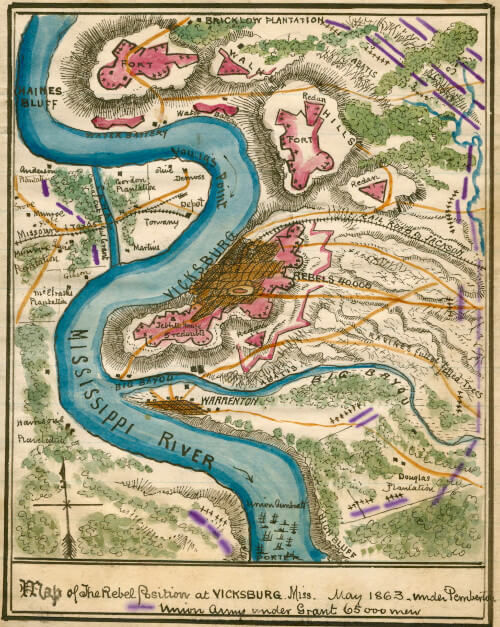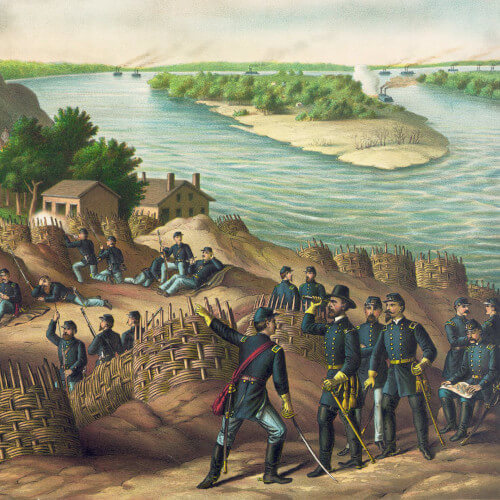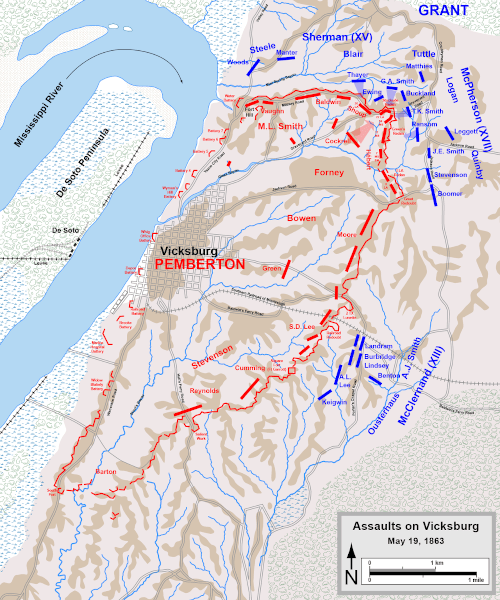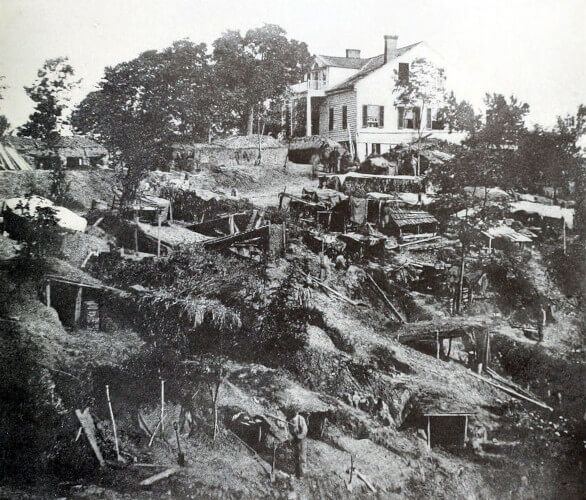Civil War Battles
Exploring some of the major battles of the Civil WarBattle of Vicksburg
The Battle of Vicksburg, Mississippi, also known as the Siege of Vicksburg, was the culmination of a long land and naval campaign by Union forces to capture a key strategic position during the Civil War. President Abraham Lincoln recognized the significance of the town and said, “Vicksburg is the key, the war can never be brought to a close until that key is in our pocket.” Lasting from May 18 to July 4, 1863, the capture of Vicksburg divided the Confederacy and opened the Mississippi River to Northern traffic along its entire length.
Prelude
Following the Battle of Shiloh in April 1862, Union General Ulysses S. Grant’s moved his troops south in an effort to gain control of the Mississippi River. The river provided an important transportation route for moving troops and supplies. The last major Confederate stronghold on the Mississippi River was the heavily fortified city of Vicksburg, Mississippi. Grant spent several months in the summer of 1862 trying to crack Vicksburg’s defenses but without success. He even tried digging a canal around the city to help move troops into position but eventually he gave up.
Renewed Attacks
On April 16, 1863, Union ships under the command of Rear Admiral David Dixon Porter sailed down the Mississippi and made it past the Confederate artillery that was defending Vicksburg from the bluffs. After arriving south of the city, the ships began transporting approximately 24,000 men and 60 guns from the west to the eastern bank of the river.
As Union forces under General Sherman marched east toward Jackson, Mississippi. Confederate forces led by General John C. Pemberton tried but failed to stop their advance at the Battle of Port Gibson and the Battle of Raymond in early May 1863. On May 14, 1863 Union forces captured Jackson. The fall of Jackson would prevent the Confederacy from sending any reinforcements or supplies to Vicksburg.
The Siege of Vicksburg
After the fall of Jacksonville, Grant took his nearly 40,000 men set off for Vicksburg while the Confederates tried unsuccessfully to stop him at the Battles of Black River Bridge and Champion Hill on May 16th and 17th. These battles cost the Confederacy nearly 20,000 soldiers and by May 18, 1863 the Confederates had retreated to Vicksburg.
The Siege of Vicksburg began on May 22 and lasted until July 4, 1863. By the end of June and into July, Confederate troops and civilians were starving and living off of rats and other animals. Pemberton surrendered his army on July 4, 1863 and this victory followed the Union victory at the Battle of Gettysburg on July 3, 1863 and helped increase Union morale. In the siege of Vicksburg and the battles leading up to the siege, Grant lost over 4,000 men while the Confederate army lost over 35,000 soldiers.
Aftermath
The Battle of Vicksburg is considered one of the major events of the war and when combined with the Union victory at Gettysburg, it is part of the turning point of the war. A few days after the fall of the Vicksburg, Port Hudson surrendered and this gave the Union control of the entire Mississippi River. This also cut the Confederacy in half and prevented the western portion of the Confederacy from communicating with Richmond.
Learn More
Ulysses S. Grant
Ulysses S. Grant was born on April 27, 1822, in Point Pleasant, Ohio to a tanner. His father suggested that he should attend the US Military Academy at West Point and even though he did not want to be a soldier, Grant saw this as an opportunity to get an education. After graduation, he served under General Zachary Taylor during the Mexican War and later served at various posts in the west. Eventually, he longed for his wife and family and left the army to return home.
At the outbreak of the Civil War, Grant rejoined the army with the Illinois militia and soon achieved the rank of general. His first major victory came when he captured Fort Donelson in Tennessee on February 16, 1862. In 1864, President Lincoln named him General-in-Chief of the entire Union Army. Grant fought against Confederate General Robert E. Lee and on April 9, 1865 Lee surrendered to Grant at Appomattox Court House, Virginia.
Due to his popularity for winning the Civil War, Grant was elected President in 1868 and served two terms in office. Unfortunately, his presidency was overshadowed by scandals and a stock market crash. He did establish the National Park System. Grant, who was a heavy cigar smoker, died of throat cancer on July 23, 1885.
John Pemberton
John Pemberton was born August 10, 1814 in Philadelphia, Pa, and graduated from West Point in 1837. Like many of his classmates, he fought in the Mexican War and was cited for bravery while participating in many of the crucial battles.
As the Civil War broke out, Pemberton resigned his commission on April 24, 1861, and went to Richmond to offer his services to the Confederacy. He was named a lieutenant colonel and immediately began organizing the cavalry and artillery in Virginia. On February 13, 1862, he became a major general in command of South Carolina, Georgia, and Florida. In October 1862 Pemberton was made a lieutenant general and given command over Mississippi, Tennessee, and eastern Louisiana.
Ordered by President Jefferson Davis to hold Vicksburg at all costs, Pemberton conducted a stubborn defense despite his lack of adequate food, ammunition, and manpower. General Ulysses S. Grant laid siege on both land and water, and by early July 1863 the Confederate defenders were suffering from starvation and exhaustion. On July 4 Pemberton accepted Grant’s terms for surrender. Shortly thereafter he resigned his commission as lieutenant general and served out the balance of the war as an ordnance inspector with the rank of colonel.
Vicksburg was important
Before the Vicksburg Campaign began, President Abraham Lincoln stated, “Vicksburg is the key. The war can never be brought to a close until the key is in our pocket.”
Before the Vicksburg Campaign began, Confederate President Jefferson Davis stated, “Vicksburg is the nail head that holds the South’s two halves together.”
The city was the link to the resource rich region west of the Mississippi River, theTrans-Mississippi, called by some historians as the breadbasket of the Confederacy. Vicksburg was the connecting link between the eastern and western parts of the Confederacy.
After the United States victory at the Battle of Vicksburg then United States President Abraham Lincoln was quoted saying “The Father of Waters again goes unvexed to the sea.”
By the Numbers
At the start of the Battle of Vicksburg the United States had around 77,000 troops and the Confederate States had around 33,000 troops.
The Battle of Vicksburg resulted in a total of 8,037 casualties.
The United States had 4,835 casualties, 766 killed, 3,793 wounded and 276 captured or missing.
The Confederate States had 32,697 casualties with 3,202 of the casualties being killed, wounded or missing.
The Confederate States had 29,495 of its troops captured as prisoners of war.
The Confederate States lost 172 cannons to the United States after the Battle of Vicksburg.
Learn More
Videos
Vocabulary
Blockade – a war measure isolating an area of importance to the enemy
Canal – an artificial waterway used for navigation or irrigation
Expansion – the act of increasing in size or volume or quantity or scope
Fortification – a defensive wall or other reinforcement built to strengthen a place against attack.
Reinforcements: Troops sent to strengthen a fighting force by adding an additional number of fresh soldiers.
Siege – a military operation in which enemy forces surround a town or building, cutting off essential supplies, with the aim of compelling the surrender of anyone inside.




